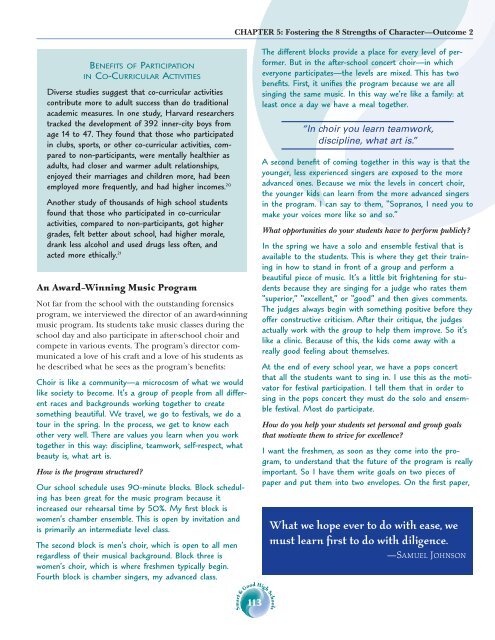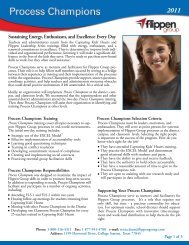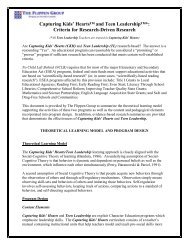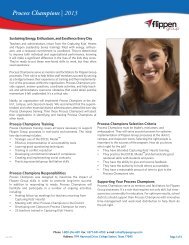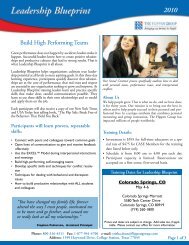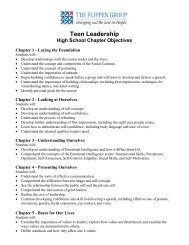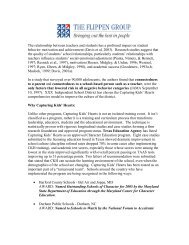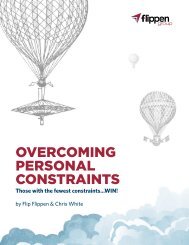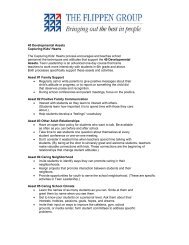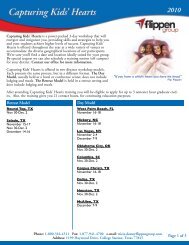Smart & Good High Schools - The Flippen Group
Smart & Good High Schools - The Flippen Group
Smart & Good High Schools - The Flippen Group
- No tags were found...
You also want an ePaper? Increase the reach of your titles
YUMPU automatically turns print PDFs into web optimized ePapers that Google loves.
<strong>Smart</strong> & <strong>Good</strong> <strong>High</strong> <strong>Schools</strong>CHAPTER 5: Fostering the 8 Strengths of Character—Outcome 2BENEFITS OF PARTICIPATIONIN CO-CURRICULAR ACTIVITIESDiverse studies suggest that co-curricular activitiescontribute more to adult success than do traditionalacademic measures. In one study, Harvard researcherstracked the development of 392 inner-city boys fromage 14 to 47. <strong>The</strong>y found that those who participatedin clubs, sports, or other co-curricular activities, comparedto non-participants, were mentally healthier asadults, had closer and warmer adult relationships,enjoyed their marriages and children more, had beenemployed more frequently, and had higher incomes. 20Another study of thousands of high school studentsfound that those who participated in co-curricularactivities, compared to non-participants, got highergrades, felt better about school, had higher morale,drank less alcohol and used drugs less often, andAn Award-Winning Music ProgramNot far from the school with the outstanding forensicsprogram, we interviewed the director of an award-winningmusic program. Its students take music classes during theschool day and also participate in after-school choir andcompete in various events. <strong>The</strong> program’s director communicateda love of his craft and a love of his students ashe described what he sees as the program’s benefits:Choir is like a community—a microcosm of what we wouldlike society to become. It’s a group of people from all differentraces and backgrounds working together to createsomething beautiful. We travel, we go to festivals, we do atour in the spring. In the process, we get to know eachother very well. <strong>The</strong>re are values you learn when you worktogether in this way: discipline, teamwork, self-respect, whatbeauty is, what art is.How is the program structured?Our school schedule uses 90-minute blocks. Block schedulinghas been great for the music program because itincreased our rehearsal time by 50%. My first block iswomen’s chamber ensemble. This is open by invitation andis primarily an intermediate level class.<strong>The</strong> second block is men’s choir, which is open to all menregardless of their musical background. Block three iswomen’s choir, which is where freshmen typically begin.Fourth block is chamber singers, my advanced class.<strong>The</strong> different blocks provide a place for every level of performer.But in the after-school concert choir—in whicheveryone participates—the levels are mixed. This has twobenefits. First, it unifies the program because we are allsinging the same music. In this way we’re like a family: atleast once a day we have a meal together.“In choir you learn teamwork,discipline, what art is.”A second benefit of coming together in this way is that theyounger, less experienced singers are exposed to the moreadvanced ones. Because we mix the levels in concert choir,the younger kids can learn from the more advanced singersin the program. I can say to them, “Sopranos, I need you tomake your voices more like so and so.”What opportunities do your students have to perform publicly?In the spring we have a solo and ensemble festival that isavailable to the students. This is where they get their trainingin how to stand in front of a group and perform abeautiful piece of music. It’s a little bit frightening for studentsbecause they are singing for a judge who rates them“superior,” “excellent,” or “good” and then gives comments.<strong>The</strong> judges always begin with something positive before theyoffer constructive criticism. After their critique, the judgesactually work with the group to help them improve. So it’slike a clinic. Because of this, the kids come away with areally good feeling about themselves.At the end of every school year, we have a pops concertthat all the students want to sing in. I use this as the motivatorfor festival participation. I tell them that in order tosing in the pops concert they must do the solo and ensemblefestival. Most do participate.How do you help your students set personal and group goalsthat motivate them to strive for excellence?I want the freshmen, as soon as they come into the program,to understand that the future of the program is reallyimportant. So I have them write goals on two pieces ofpaper and put them into two envelopes. On the first paper,What we hope ever to do with ease, wemust learn first to do with diligence.—SAMUEL JOHNSONacted more ethically. 21 113


